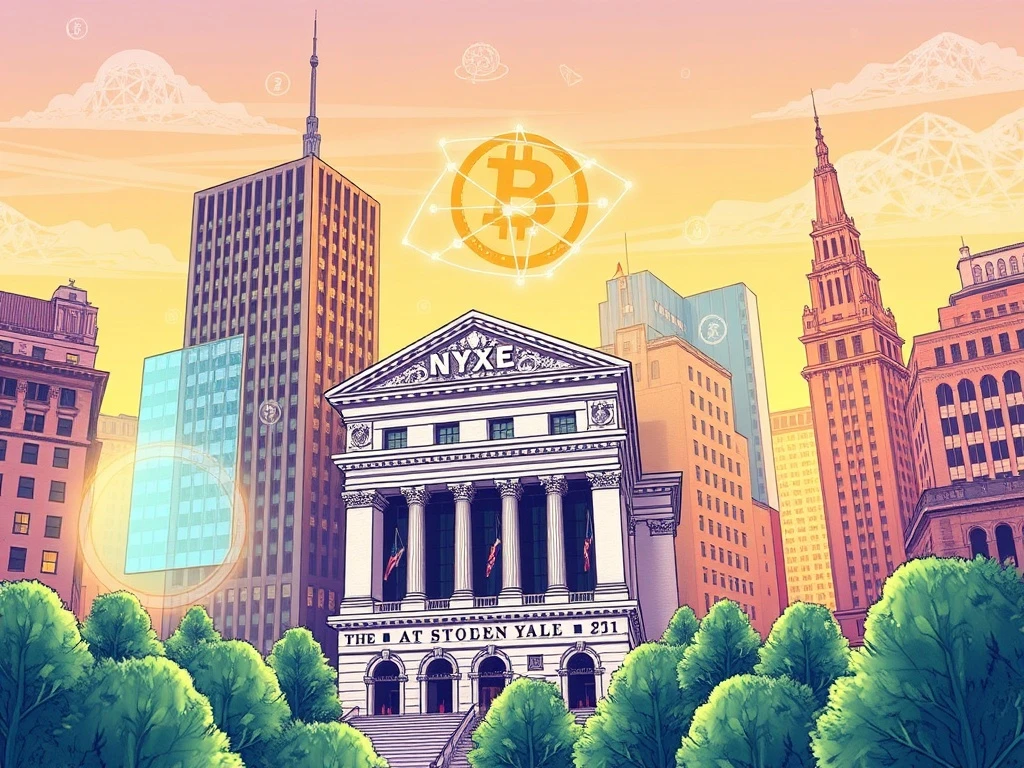Robinhood Tokenization Threatens NYSE Revenue, Warns Galaxy Digital

Get ready for a potential shake-up in the world of finance. Popular trading platform Robinhood is making a significant push into asset Tokenization, and it could have major implications for traditional players like the NYSE. A recent report from Galaxy Digital highlights just how serious this challenge might be.
Robinhood’s Ambitious Tokenization Strategy
At the EthCC conference, Robinhood CEO Vlad Tenev unveiled plans for ‘Robinhood Chain.’ This new layer-2 solution, built on Arbitrum Orbit and compatible with Ethereum, aims to bring traditional assets onto the blockchain. The core idea is to allow users to trade tokenized derivatives of stocks directly onchain, moving trading beyond standard market hours.
Here’s how Robinhood plans to do it:
- A new token engine on Robinhood Chain will create tokenized derivatives.
- These tokens will be linked to real stocks held by a US broker-dealer.
- Users can self-custody these tokens or use them in decentralized applications.
- Initially, the platform will offer 24/5 trading, with plans to expand to 24/7.
This initiative leverages Robinhood’s acquisition of crypto exchange Bitstamp, showing a clear commitment to integrating crypto capabilities.
How Tokenization Challenges NYSE and Traditional Markets
Galaxy Digital’s report points out that Robinhood’s move directly challenges the existing structure of traditional finance. By bringing assets onchain, Robinhood is creating an alternative trading venue that could divert liquidity away from exchanges like the NYSE.
Traditional exchanges rely heavily on trading fees and market data sales for revenue. If a significant portion of trading volume shifts to blockchain-based platforms offering different benefits, it could undermine this core revenue stream.
Galaxy notes that Robinhood Chain’s architecture, similar to rollups like Coinbase’s Base, gives Robinhood control over its sequencer. This allows Robinhood to capture transaction fees, potentially monetizing multiple layers of the trading process, from offchain order matching to onchain settlement and utility.
Galaxy Digital’s Perspective on the Shift
According to Galaxy Digital, the deep concentration of liquidity on major traditional exchanges like the NYSE is their primary competitive advantage. Robinhood’s tokenization effort aims to disrupt this concentration by creating a parallel, onchain market.
The appeal of tokenized assets extends beyond just 24/7 trading. Their inherent programmability opens up new possibilities that traditional equities lack. Imagine using tokenized stocks as collateral in DeFi protocols or automating dividend payments directly onchain. These features could attract traders seeking greater flexibility and utility.
Galaxy warns that if incumbent exchanges fail to match the functionality offered by tokenized assets, they risk becoming mere custodians of less useful versions of the same assets, potentially pushing more activity towards blockchain platforms.
Benefits and Risks of Robinhood Chain
The move towards tokenized assets on a platform like Robinhood Chain offers several potential benefits:
- Near-instant settlement compared to traditional T+2 cycles.
- Expanded trading hours, potentially 24/7 access.
- Programmability enabling new use cases like DeFi integration.
- Increased control and self-custody options for users.
However, there are also risks to consider, particularly for retail investors:
- Increased volatility risk due to 24-hour trading; prices could move significantly while markets are typically closed.
- Regulatory uncertainty remains a major challenge. The SEC has not publicly commented on this model, and industry groups have expressed concerns about trading tokenized equities outside existing frameworks like Regulation NMS.
Currently, Robinhood’s tokenized assets are available only to EU users, highlighting the regulatory hurdles that need to be addressed, especially in the United States.
Concluding Thoughts: The Future of Trading?
Robinhood’s venture into tokenization, as analyzed by Galaxy Digital, represents a significant step towards bridging traditional finance and blockchain technology. By creating Robinhood Chain and offering tokenized assets, Robinhood is not just adding a feature; it’s building an alternative infrastructure that could challenge the dominance of established exchanges like the NYSE.
While the benefits of 24/7 trading, faster settlement, and programmability are compelling, regulatory clarity and managing volatility risks will be crucial for widespread adoption. The coming years will show whether tokenization can truly reshape the financial landscape and divert substantial trading volume to blockchain-based platforms.







